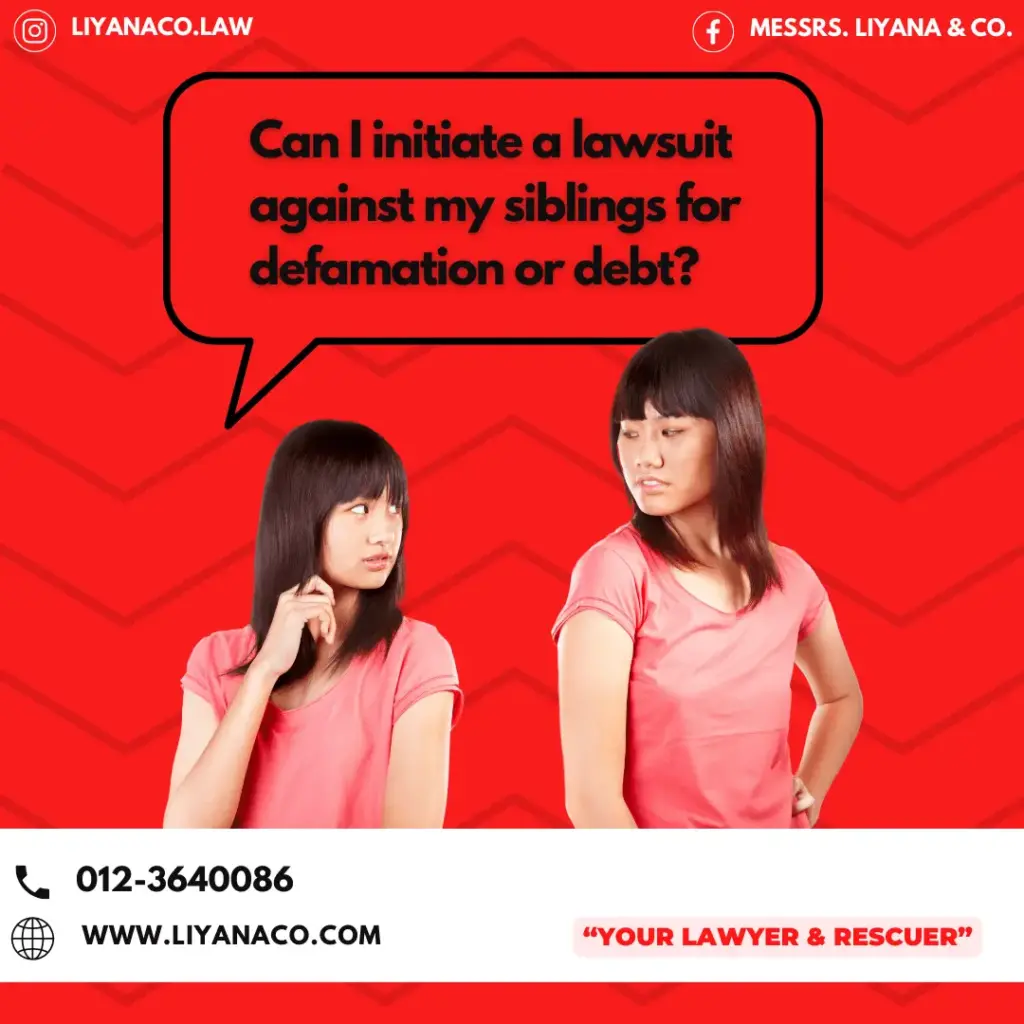
ANSWER:
Sure! This is considered a defamation suit even in a family member. Referring to the case that was decided by the Kuala Lumpur High Court in 2019, the brother-in-law and sister sued their own sister for making defamatory statements on social media and embarrassing the brother-in-law and sister.
Let’s follow the case that has been decided by Kuala Lumpur High Court.
CASE FACTS.
A small fight took place between the two parties starting with a post by the younger sister (Defendant) who claimed that her sister (Plaintiff) owed him RM20,000.00 and the status was uploaded on the Facebook page.
According to the Plaintiff, those words are slanderous words because the Defendant is not telling the truth.
The Plaintiff demands from the Defendant to publicly apologize to the Plaintiff unconditionally, post an open apology on Facebook, apologize via WhatsApp, advertise the apology in the Bahasa Melayu daily newspaper and also compensation.
The Defendant argued that she did not slander the Plaintiffs but only demanded her money back. In fact, according to the Defendant, it was the Plaintiffs who challenged the Defendant to viral this matter and stated that she did not care if it was viral.
The first element of a defamation suit is discussed
Let’s follow each of the elements discussed in this case
FIRST ELEMENT:
Are the Defendant’s words or statements defamatory?
ANSWER:
After examining the statement presented on the “Facebook” page/post and read in the context of this case, the Court is of the opinion that the statement is not defamation of the Plaintiff as claimed in the pleading.
Through testimony, the Plaintiff actually agreed that there was a debt and the Plaintiff was willing to pay the debt but at his discretion. Therefore, the Court has the opinion that the Plaintiffs are actually admitting that the intended debt exists but the amount is not as claimed by the Defendant. With the Plaintiff’s admission that it is true that the Plaintiff owes the Defendant, then the Defendant cannot be said to have defamed the Plaintiff.
The second element of a defamation suit is discussed
SECOND ELEMENT:
Do the Defendant’s words or statements refer to the Plaintiff?
ANSWER:
For the second element, this is significant because the names of the Plaintiffs are stated and written in the Facebook and WhatsApp posts/status.
In addition, the Defendant admitted that during cross-examination that the person referred to in her Facebook post was the Plaintiff. Therefore, for the second element, the Court thinks the Plaintiff has successfully proved it.
The third element of a defamation suit is discussed
THIRD ELEMENT:
Have the Defendant’s statements or words been published or delivered to a third party?
ANSWER:
Regarding the third element the Court does not agree with the Defendant’s argument that there is no publication to Third parties. The court is of the opinion that when the Defendant uploads a status to her Facebook that is set for public viewing, then it can be assumed that it has been disseminated to third parties.
Furthermore, in this case, there are comments made in the status. As for the WhatsApp application, this third element failed to be proven because it was spread by the Plaintiff herself after the Plaintiff uploaded it herself to the group of her family members, “Mohamad Family” group. Therefore, for the Facebook status or posting, it is clear in the Court’s view that distribution to third parties has occurred. Thus, this third element has also been successfully proven.
The Case of Siblings Fighting Up in a defamation Lawsuit? Lets see Judge’s decision
Case Nur Riduwan bin Haji Muhamad Ali dan satu lagi lwn Nur Suhaila binti Mohamad [2019] MLJU 485.
JUDGE’S DECISION FOR THIS CASE.
Through explanation, the Plaintiff actually agreed that there was a debt and the Plaintiff was willing to pay the debt but at his discretion. Therefore, the Court is of the opinion that the Plaintiffs are admitting that the intended debt exists, but the amount is not as claimed by the Defendant.
With the Plaintiff’s admission that it is true that the Plaintiff owes the Defendant, then the Defendant cannot be said to have defamed the Plaintiff. After the full hearing was conducted, the Court decided to reject the Plaintiff’s claim with a cost of RM5,000.00.
Let’s get legal advice from our professional and dedicated lawyers.
Our lawyers have 10 years of experience in solving complex legal problems for people.
“Your Lawyer & Rescuer”